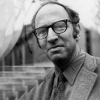Thomas Kuhn

Thomas Kuhn
Thomas Samuel Kuhnwas an American physicist, historian, and philosopher of science whose controversial 1962 book The Structure of Scientific Revolutions was influential in both academic and popular circles, introducing the term "paradigm shift", which has since become an English-language idiom...
NationalityAmerican
ProfessionPhilosopher
Date of Birth18 July 1922
CountryUnited States of America
Thomas Kuhn quotes about
fully individual occurs revolution scientific stable
What occurs during a scientific revolution is not fully reducible to a reinterpretation of individual and stable data.
political-revolution favors way
Political revolutions aim to change political institutions in ways that those institutions themselves prohibit. Their success therefore necessitates the partial relinquishment of one set of institutions in favor of another, and in the interim, society is not fully governed by institutions at all
communication language revolutionary
Communication across the revolutionary divide is inevitably partial.
science political-revolution impact
As in political revolutions, so in paradigm choice--there is no standard higher than the assent of the relevant community. To discover how scientific revolutions are effected, we shall therefore have to examine not only the impact of nature and of logic, but also the techniques of persuasive argumentation effective within the quite special groups that constitute the community of scientists.
issues political-revolution community
As in political revolutions, so in paradigm choice-there is no standard higher than the assent of the relevant community... this issue of paradigm choice can never be unequivocally settled by logic and experiment alone.
powerful way revolution
The crises of our time, it becomes increasingly clear, are the necessary impetus for the revolution now under way. And once we understand nature's transformative powers, we see that it is our powerful ally, not a force to feared our subdued.
alone candidate faith neither nor particular rational though ultimately
Crisis alone is not enough. There must also be a basis, though it need be neither rational nor ultimately correct, for faith in the particular candidate chosen.
home past discovery
Concerned to reconstruct past ideas, historians must approach the generation that held them as the anthropologist approaches an alien culture. They must, that is, be prepared at the start to find that natives speak a different language and map experience into different categories from those they themselves bring from home. And they must take as their object the discovery of those categories and the assimilation of the corresponding language.
men evaluation facts
Its assimilation requires the reconstruction of prior theory and re-evaluation of prior fact, an intrinsically revolutionary process that is seldom completed a single man and never overnight
data doe different
Though the world does not change with a change of paradigm, the scientist afterward works in a different world... I am convinced that we must learn to make sense of statements that at least resemble these. What occurs during a scientific revolution is not fully reducible to a re-interpretation of individual and stable data. In the first place, the data are not unequivocally stable.
philosophy law able
What chemists took from Dalton was not new experimental laws but a new way of practicing chemistry (he himself called it the 'new system of chemical philosophy'), and this proved so rapidly fruitful that only a few of the older chemists in France and Britain were able to resist it.
science may world
The historian of science may be tempted to exclaim that when paradigms change, the world itself changes with them.
normal fit scientist
No part of the aim of normal science is to call forth new sorts of phenomena; indeed those that will not fit the box are often not seen at all. Nor do scientists normally aim to invent new theories, and they are often intolerant of those invented by others.
knowledge play community
Groups do not have experiences except insofar as all their members do. And there are no experiences... that all the members of a scientific community must share in the course of a [scientific] revolution. Revolutions should be described not in terms of group experience but in terms of the varied experiences of individual group members. Indeed, that variety itself turns out to play an essential role in the evolution of scientific knowledge.